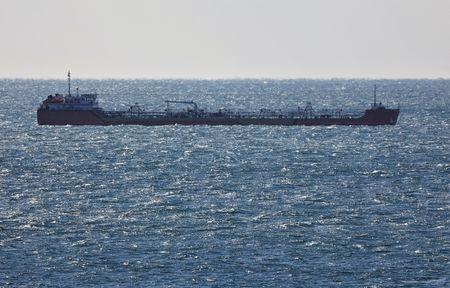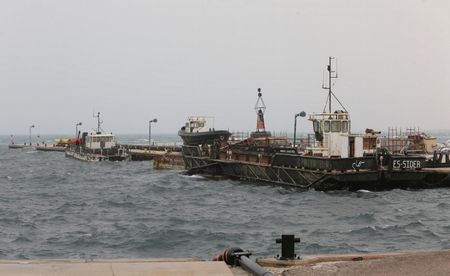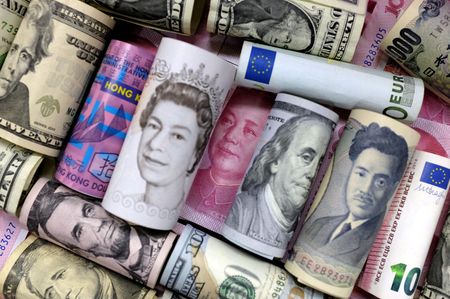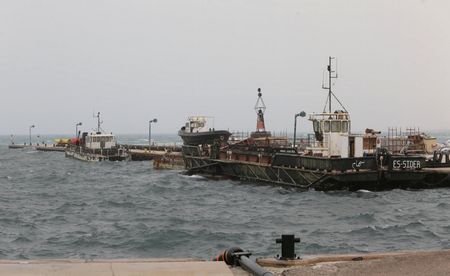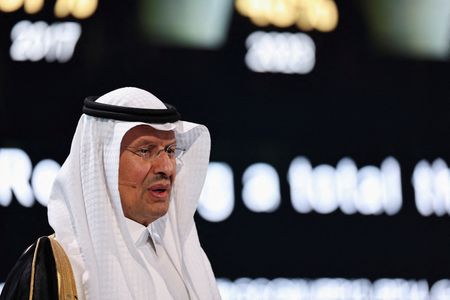By Scott DiSavino
NEW YORK (Reuters) -Oil prices fell about 2% to a two-week low on Monday as news of surging interest in Chinese startup DeepSeek’s low-cost artificial intelligence (AI) model prompted concerns over energy demand to power data centers.
Before the news of DeepSeek broke, oil was already trading lower on weak economic data from China and worries that U.S. President Donald Trump’s proposed tariffs could further pressure economic growth and energy demand.
Brent futures fell $1.42, or 1.8%, to settle at $77.08 a barrel, while U.S. West Texas Intermediate (WTI) crude ended $1.49, or 2.0%, lower at $73.17.
Brent closed at its lowest since Jan. 9 and WTI at its lowest since Jan. 2.
Chinese startup DeepSeek’s AI Assistant overtook U.S. rival ChatGPT to become the top-rated free application available on Apple’s App Store in the U.S. That fed doubts among investors who have poured money into U.S. energy firms hoping AI would drive demand for energy to power data centers.
“The DeepSeek model is (reported to be) more energy and capital efficient, which calls into question the significant electric demand projections for the U.S.,” analysts at Jefferies, an investment bank, said in a report, noting AI represents about 75% of overall U.S. demand forecasts through 2030-2035 in most projections.
“It is still early to draw conclusions on the outlook in the immediate aftermath of DeepSeek, but the 20%(-plus) YTD (year-to-date) rally in power companies looks exposed,” Jefferies said.
In other news from China, the world’s second biggest economy behind the U.S., manufacturing data was weaker than expected, adding fresh concerns over energy demand.
“The weak readings highlight the need for more policy efforts to stabilize economic growth,” analysts at Citibank said in a report.
TRUMP ON TARIFFS AND OPEC
Analysts said oil prices have been depressed in recent days following President Trump’s call last week for the Organization of the Petroleum Exporting Countries to reduce oil prices.
“President Trump continued to put the pressure on OPEC … calling on the producer group to lower prices to help end the Russian war in Ukraine,” Bob Yawger, director of energy futures at Mizuho, said in a report.
OPEC and its allies including Russia in the OPEC+ group have yet to react to Trump’s call, with OPEC+ delegates pointing to an existing plan to start raising oil output from April.
Trump’s tariff threats have also mostly pressured oil prices, feeding worries that a trade war could hurt global economic growth and oil demand.
Over the weekend, the U.S. threatened and then swiftly reversed plans to impose sanctions and tariffs on Colombia after the South American nation agreed to accept deported migrants from the U.S.
Colombia last year sent about 41% of its seaborne crude exports to the U.S., data from analytics firm Kpler shows. The agreement will allow that oil to continue to flow, another factor pressuring crude prices on Monday.
(Reporting by Scott DiSavino, Anna Hirtenstein and Robert Harvey; Additional reporting by Florence Tan; Editing by Marguerita Choy and David Gregorio)

